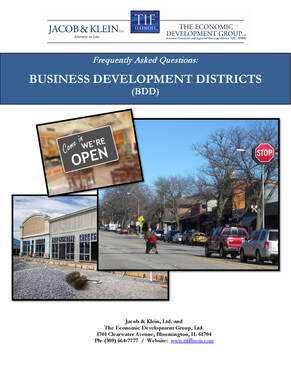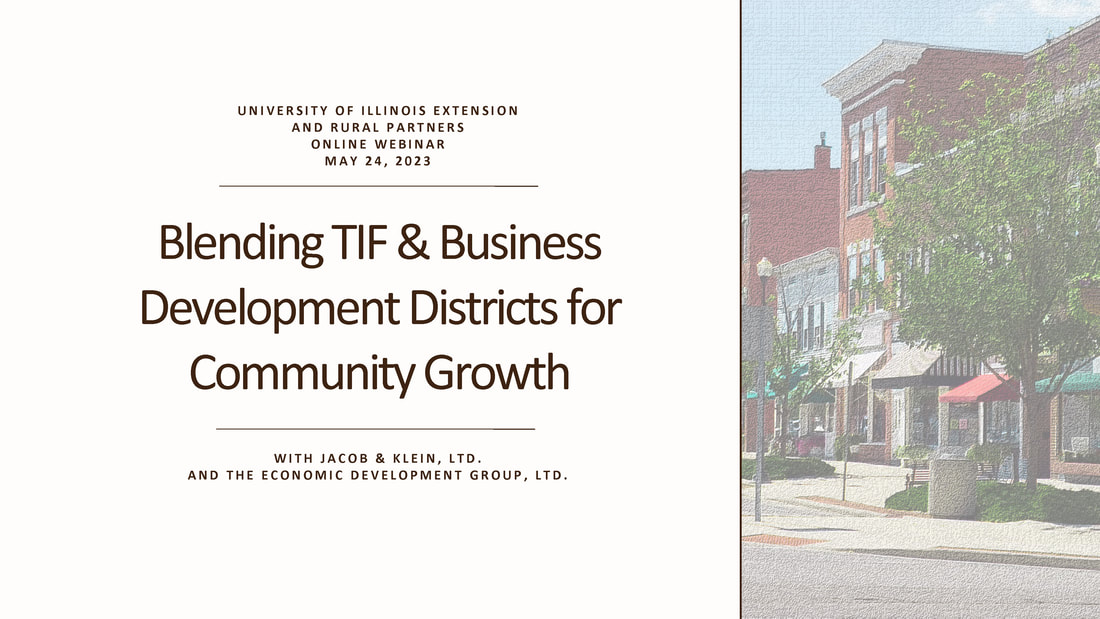What is a Business Development and Redevelopment District?
|
A Business Development and Redevelopment District, often referred to as a Business Development District (BDD) is a special financing program created by a municipality to encourage the development of new businesses in targeted areas of the community. This program enables municipalities to attract development on vacant properties and redevelop existing properties within a designated BDD Area. New business development will increase local services and amenities, increase employment opportunities, and increase sales and property tax revenues to the municipality and other taxing bodies.
This economic development tool is very flexible and allows districts to impose and collect up to 1.0% additional retail sales tax and hotel tax to fund any project that benefits the district. Business Development Districts allow municipalities to make and enter into all contracts necessary or incidental to the furtherance of a business district plan – including payments to private developers for eligible business district project costs. The Illinois Department of Revenue publication (PTAX-1002-20) addresses many of the common questions and procedures relating to the Business District Development and Redevelopment Act (65 ILCS 5/Art. 11 Div. 74.3 et. seq.). Where are Business Development Districts in Illinois ? |
What additional powers within a designated BDD Area are provided to a municipality?
- approve all development and redevelopment plans within the BDD;
- acquire, manage, convey or otherwise dispose of real and personal property for the purposes of a development or redevelopment plan;
- fix, charge, and collect fees, rents, and charges for the use of any building, facility, or property or any portion thereof owned or leased by the municipality;
- make and enter into all contracts necessary or incidental to the implementation and furtherance of a business district plan;
- apply for and accept grants, guarantees, donations of property or labor or any other thing of value for use in connection with a BDD project;
- clear any area within a business district by demolition or removal of any existing buildings, structures, fixtures, utilities, or improvements, and to clear and grade land;
- install, repair, construct, reconstruct, or relocate public streets, public utilities, and other public site improvements;
- renovate, rehabilitate, reconstruct, relocate, repair, or remodel any existing buildings, structures, works, utilities, or fixtures;
- construct public improvements, including but not limited to buildings, structures, works, utilities, or fixtures;
- impose up to 1.0% additional retailers' occupation tax and service occupation tax for the planning, execution, and implementation of business district plans;
- impose up to 1.0% additional hotel operators' occupation tax in the business district for the planning, execution, and implementation of business district plans;
- issue debt obligations in one or more series bearing interest at rates determined by the corporate authorities of the municipality to provide for the payment of eligible BDD project costs; and
- otherwise pay or cause to be paid eligible business district project costs, including costs relating to the establishment and annual administration of the BDD.
How is a BDD different from a TIF District?
The statutory process to establish a BDD is less complicated than creating a TIF District, because a BDD does not affect the collection or distribution of real estate taxes. The BDD Fund receives increased retail sales taxes and/or hotel taxes generated by commercial-retail development occurring within the BDD Area. As is the case with TIF, a BDD Area must be a contiguous boundary, the municipality must prepare a BDD Redevelopment Plan and hold a public hearing. A BDD can usually be established within 60-90 days by a simple majority vote of the municipality’s corporate authority. A BDD may be established for a period not exceeding twenty-three (23) years.
What types of costs are eligible for reimbursement with BDD funds?
"Business district project costs" include the sum total of all costs incurred by a municipality, other governmental entity, or nongovernmental person in connection with a business district, in the furtherance of a business district plan, including, without limitation, the following:
- Plans & Studies: Costs of studies, surveys, development of plans and specifications, implementation and administration of a business district plan, and personnel and professional service costs including architectural, engineering, legal, marketing, financial, planning, or other professional services, provided that no charges for professional services may be based on a percentage of tax revenues received by the municipality;
- Land Acquisition: Property assembly costs, including but not limited to, acquisition of land and other real or personal property or rights or interests therein, and specifically including payments to developers or other nongovernmental persons as reimbursement for property assembly costs incurred by that developer or other non-governmental person;
- Site Preparation: Site preparation costs, including but not limited to clearance, demolition or removal of any existing buildings, structures, fixtures, utilities, and improvements and clearing and grading of land;
- Public Infrastructure: Costs of installation, repair, construction, reconstruction, extension, or relocation of public streets, public utilities, and other public site improvements within or without the business district which are essential to the preparation of the business district for use in accordance with the business district plan, and specifically including payments to developers or other nongovernmental persons as reimbursement for site preparation costs incurred by the developer or nongovernmental person;
- Renovations to Existing Buildings: Costs of renovation, rehabilitation, reconstruction, relocation, repair, or remodeling of any existing buildings, improvements, and fixtures within the business district, and specifically including payments to developers or other nongovernmental persons as reimbursement for costs incurred by those developers or nongovernmental persons;
- Construction of New Buildings: Costs of installation or construction within the business district of buildings, structures, works, streets, improvements, equipment, utilities, or fixtures, and specifically including payments to developers or other nongovernmental persons as reimbursements for such costs incurred by such developer or nongovernmental person;
- Reduced Financing Costs: Financing costs, including but not limited to all necessary and incidental expenses related to the issuance of obligations, payment of any interest on any obligations issued under this Law that accrues during the estimated period of construction of any development or redevelopment project for which those obligations are issued and for not exceeding 36 months thereafter, and any reasonable reserves related to the issuance of those obligations; and
- Relocation Costs: Relocation costs to the extent that a municipality determines that relocation costs shall be paid or is required to make payment of relocation costs by federal or state law.
For more information about establishing and using a Business Development District,
please contact The Economic Development Group, Ltd. at our Bloomington office.
please contact The Economic Development Group, Ltd. at our Bloomington office.


